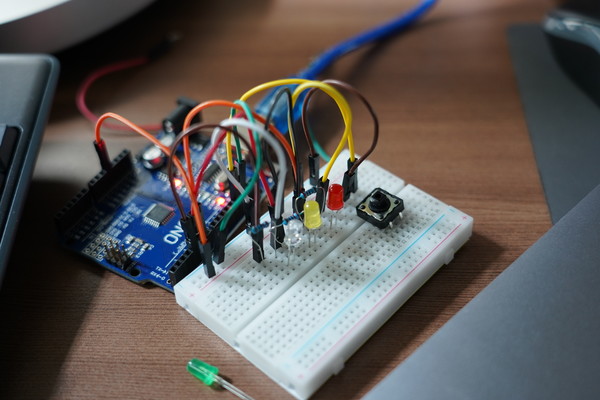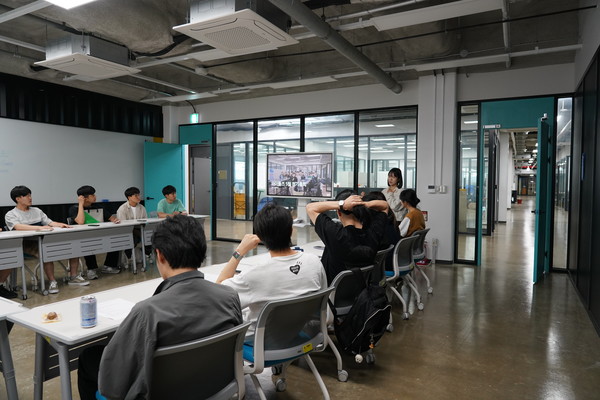Introducing Yonsei University’s making club, Y-Tools
HERE AT Yonsei University, there is a group of people who use their skills to better humanity. They design, construct, and execute projects to help solve societal problems and benefit people. Meet Y-Tools, a making club that turns imagination into reality using advanced technology. The Yonsei Annals interviewed the President of Y-Tools, Kim Ye-chae (Soph., Dept. of Integrated Display Engin.), to take a deeper dive.

Annals: Could you briefly introduce Y-Tools?
Kim: Y-Tools is a making club at Yonsei University that turns imagination into reality. “Making” is not only referred to as its literal meaning of creating something, but also creating something with a purpose. Even if it is for the most trivial or tacky reasons, making with and without asking “why” are essentially different. And at Y-Tools, we create projects—from a table for our club room to an artwork for a competition—that people need.
Annals: Who can join the club? Are there any requirements?
Kim: Our club has a variety of students from all majors, colleges, and years. For those who are worried about having any knowledge on “making,” we hold workshops for newly recruited members every term to teach the basics. Therefore, no previous experience is required to join. We welcome anyone who is interested in creative projects, so consider our upcoming recruitment in March!
Annals: Tell us about your regular meetings.
Kim: Our regular workshops and meetings are held on Fridays at Makerspace i7. This space is in a renovated underground parking garage on Yonsei’s International Campus, where various equipment such as 3D printers, UV printers, laser cutters, printed circuit boards (PCB), and woodworking equipment are available for use. The payment to use this equipment is included in our club membership fees—₩30,000 for three months per person—along with all other activities and material costs.
Annals: There are three teams in Y-Tools; can you explain the roles and activities of each team?
Kim: Y-Tools is composed of the Making Team, Media Contents Team, and Mini Startup Team. The Making Team works on making projects as a team or individually and participates in related competitions and contests. The Media Contents Team records the meetings and activities of our club through photos and videos. They are also responsible for managing our social media accounts and creating various promotional content. Last but not least, the Mini Startup Team shares startup ideas, writes the business plan, and develops it with expert advice in groups of 2 to 3 people. You can join more than one team.

Annals: Can you share more about the competitions and “maker-thons?” Have you won any awards?
Kim: Competitions and conventions are an essential part of our club. We divide our members into teams to participate in external competitions or host internal competitions, named “maker-thons.” In the past, we have organized a robotics competition and a maker exhibition within our club, not to mention a joint maker-thon with Korea University. Students of Yonsei University’s Y-Tools and Korea University’s X-GARAGE held the 2022 Maker-thon, and for two days without sleep, created projects for preventing personal mobility accidents.
As for awards, we have won first, second, and third place in the Maker Work category of the Hello Maker Awards in 2022 and 2023. The winning projects of the 2022 Hello Maker Awards were "Rain Gutter Improvement System to Prevent Flooding," which was designed to minimize the clogging and damaging of rain gutters by trash, and a "Movement Mimicking Robot Arm” with motors that simulate human arm movements. The winners of the 2023 Hello Maker Awards were "Memory Gym," a device that facilitates hand-exercises to help prevent dementia, and "Knitwear Clothes Washing Machine," which can wash knitwear without damaging the fabric.
Annals: What is the most challenging aspect of working as a team? How do you and your teammates solve problems when they arise?
Kim: It is not uncommon to face unexpected errors when working on a project. The most challenging part is fixing these errors, especially under a tight deadline because scheduling times among members is difficult. The solution is to delegate tasks clearly, with each person taking on parts that they are most confident in—whether that is planning, coding, or designing. Everyone must use their spare time efficiently and put in the effort to complete the project.
Annals: What is your most memorable startup idea?
Kim: I remember the idea to produce the most efficient laundry rack that would best suit the structure of the dorms in the International Campus. It was memorable because this idea would benefit first-year students who need convenient dormitory items. I guess we gravitated towards targeting our freshmen as our club is mainly active on the International Campus.
Annals: What makes Y-Tools stand out from other clubs?
Kim: The best thing about Y-Tools is that your ideas become a reality. From small everyday items such as keyrings and mugs to grander works of art and world-changing inventions, you get to make them with your own hands. And all your projects are supported through the provided spaces and tools.
Annals: Finally, do you have any last words for students who want to join Y-Tools?
Kim: We all have different making experiences, and we all have different equipment or programs we can handle. But when we come together and work as a team, we can create anything! If you are interested in exploring the fascination of making with tools, we would love to hear from you.

